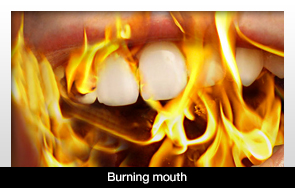 |
Nothing appears to be wrong when a person has this disease, but nothing could be further from the truth.
That’s what burning mouth syndrome sufferers deal with on a daily basis. They feel the kind of oral pain that generally stems from a scalded mouth, only the pain doesn’t get better after a few days.
The condition continues to befuddle dental researchers. At various times, the issue has been tied to mucosal, periodontal or restorative disorders. Mental or emotional causes have also been cited as the reason for people developing this condition.
Burning mouth syndrome sufferers also need to visit a dentist multiple times before their condition can be diagnosed. Some of the usual symptoms include (1) burning tongue and oral pain for no reason, (2) abnormal taste or dry feeling in one’s mouth, and (3) burning sensations that could shift to various oral areas. But the strange part is the symptoms would go away during meals.
About 2 to 5 percent of the American population acquires this condition. The demographic most impacted is women from ages 50 through 70 from three years prior through 12 years after menopause.
Changes in neurologic sensory function have been known to cause BMS. Anemia, diabetes, vitamin deficiency and thyroid problems could lead to BMS. The specific cause of BMS is still a mystery but the common thread among BMS sufferers is damage or withering away of the nerves beneath the oral lining. This deterioration can’t be seen just by looking, which explains why the diagnosis is to difficult to make.
It is uncertain what, if any, impact hormones play in the condition. But it dramatically alters a person’s quality of life and may even lead to suicide.
There are special mouthwashes, analgesics and other topical treatments that can be used to attempt to curb the effects of BMS.
The recent issue of the Journal of the American Dental Association mentions that BMS is now being taught to dental students but a great deal of work needs to be done to deal with the condition in a more effective manner.









